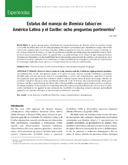Estatus del manejo de Bemisia tabaci en América Latina y el Caribe: ocho preguntas pertinentes
ISSN
1659-008Fecha de publicación
2003Autor
Hilje, Luko
Tipo
Artículo
Metadatos
Mostrar el registro completo del ítemTítulo alternativo
Whitefly (Bemisia tabaci) status in Latin America and the Caribbean: eight pertinent questions
Descripción
8 ilus. 2 tab. Bib. 87-89
Resumen
Se aporta un panorama actualizado del estatus del manejo de Bemisia tabaci en América Latina y el Caribe, mediante una serie de ocho preguntas relevantes o pertinentes que contribuyen a lograr una visión crítica y de conjunto sobre los avances logrados. Dichas preguntas se refieren a cuánto se conoce realmente sobre la bioecología de B. tabaci a si todos los problemas causados por dicha plaga son imputables solo al biotipo B al escaso conocimiento sobre los geminivirus y su epidemiología a los riesgos de que surjan problemas fitosanitarios inusitados a la insostenibilidad de los insecticidas como método de combate a la eficacia de otros métodos de manejo aplicados en el continente a la funcionalidad de los conceptos y métodos de transferencia de tecnología empleados hasta ahora y a la importancia de las redes de colaboración. An updated view on the management status of B. tabaci in Latin America and the Caribbean is provided, through eight relevant questions aimed at accomplishing a critical and comprehensive appraisal of current developments. Such questions deal with how much is actually known about B. tabaci bioecology whether all problems caused by this pest can be attributed exclusively to the B biotype the scant knowledge about geminiviruses and their epidemiology the likely risks of facing sudden and unprecedented phytosanitary problems the unsustainability of insecticides for controlling whiteflies and associated problems the effectiveness of other control methods so far applied in our continent the feasibility of technology transfer concepts and methods applied so far and the relevance of international collaborative networks.
Palabras clave
Editor
Centro Agronómico Tropical de Investigación y Enseñanza (CATIE), Turrialba (Costa Rica)


